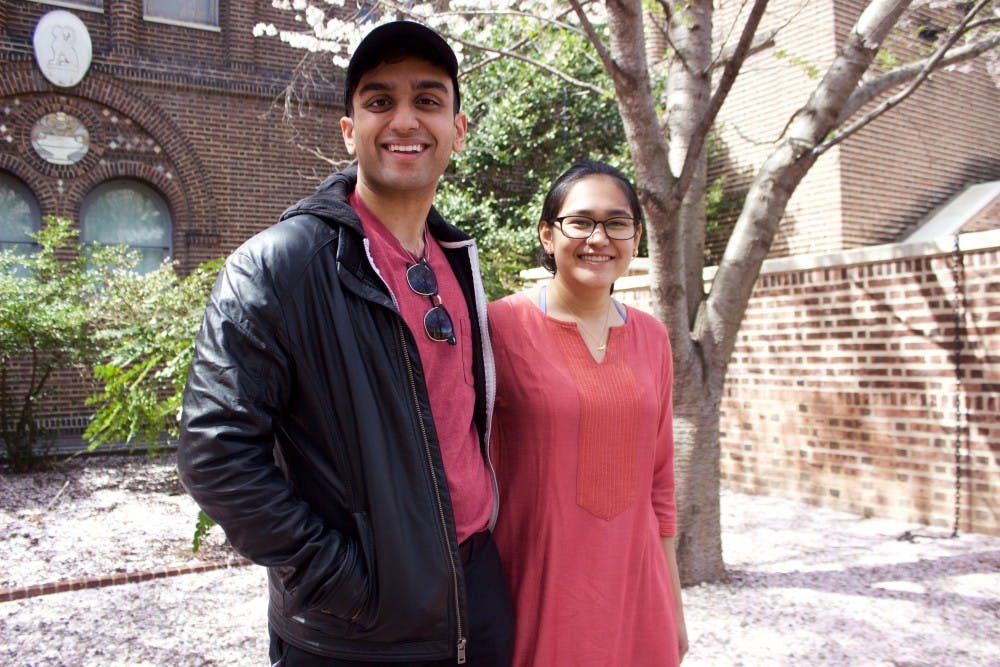The study of religion is often seen as something that doesn’t quite belong in secular, academic circles. Empiricism is in; mysticism is long out.
This belief, however, is based on a number of misconceptions about the field of religious studies—misconceptions that Anuj Amin (C ’18) and Julia Chatterjee (C ’17) hope to dispel with the brand–new Penn Undergraduate Journal of Religious Studies, which is currently accepting submissions (from students in any department) for its inaugural issue.
“Religious studies isn’t about projecting your own faith,” Julia said. “It’s about deconstructing the elements of what makes up religion.”
In that sense, then, religious studies has every right to a place in academic circles. Rather than promoting one faith (or promoting faith at all), it seeks to understand any and all faiths.
“Religion is something that we can’t actually define,” Julia adds. “That’s why I feel like [the field of] religious studies is profitable. Because it’s undefinable, [religion] requires study in a more systematic way.”
Few students are actively involved in the department at Penn—Anuj says there are only three or four RELS majors in his year—but Anuj, Julia and the rest of the journal’s board want to help the public understand that religion is an inescapable part of everyone’s lives, despite the small number of students who make it their business to study it.
Neither of the two co–founders concentrates in the Religious Studies department exclusively: Anuj is triple–majoring in Religious Studies, Classical Studies and Anthropology, and he describes his primary area of interest as “hell, death and demonology.” Julia, on the other hand, is majoring in South Asia Studies and Near Eastern Languages and Cultures, and concentrates on the intersection of those fields—since after all, as she says, South Asia and the Near East are “one contiguous landmass.”
“They’re all really itty–bitty,” Julia adds, with regard to Religious Studies and its related departments. “That’s why we need a place where we can bring all of these people together and recognize that we have a real, substantial community.”
According to Anuj, the only way in which the field of religious studies comes close to being formally centralized is in the American Academy of Religion. For undergraduates, there exists only Theta Alpha Kappa, the national society for religious studies and theology; as far as undergraduate journals go, Yale once had one, but it no longer exists.
With the Penn Undergraduate Journal of Religious Studies, Anuj hopes to create a “platform for discussion” that fills a much–needed void in the field. The idea arose from a conversation he had with Professor Justin McDaniel of the Department of Religious Studies about creating extracurriculars for undergraduate and graduate students in the department.
“Essentially, the journal is trying to establish a culture that students who are interested in these tiny departments can participate in,” Anuj said. “It’s really cool to be able to talk to people your own age about these questions.”
Despite the community–oriented focus of the journal, Anuj and Julia stress that submissions are open to students from every department. Pursuant to this, they’ve sent calls for submissions to (nearly) every department at Penn.
“For the first issue, we want to be able to encapsulate as many voices as we can,” Anuj said. “The study of religion isn’t limited to the Religious Studies department. It trickles into psychology. It trickles into, in some senses, mathematics. We want to see papers from everywhere.”
Once a submission passes the initial round of selection, board members who specialize in the subject of the submitted paper will work with the paper’s author to help make the paper exactly what the journal’s looking for. The board was constructed so that each board member has a different concentration in the field of religious studies and specializes in different ancient languages, enabling the journal to handle a range of submissions.
“Then we’ll compile [the submissions] in a PDF, and [the journal] is engraved in stone — metaphorically speaking,” Anuj said. “Print costs a lot of money, so contingent on how many submissions we receive, we might start printing next semester.”
The website is in the final stages of its development—Anuj jokes that since the board members are all involved in various fields of ancient studies, “technology is a new frontier” for them.
“We’re really trying,” Anuj said. “We work with manuscripts, not HTML.”
Once the website is up, it will feature a biweekly, research–oriented blog (titled The Manuscript). Anuj and Julia hope that the blog, featuring posts written by board members about their own research or that of affiliated professors, will serve as a resource for undergraduate students interested in humanities research—which, Julia emphasizes, is research, despite the fact that it may not have all the traditional, scientific trappings of what students usually think of as “research.”
“Penn is a really pre–professional school,” Julia said. “There are people who devote hours and hours to significant research projects [in the humanities] that don’t necessarily get as much visibility.”
The co–founders stress, however, that they’d like to see journal submissions from students in any department, however unexpected their approaches might be.
“Even if you’re a physics major or an econ major, you should definitely consider submitting to the journal," Julia said. "It’s a great way to get your voice out—to contribute to a dynamic discussion that matters to everybody.”
As an example: for economics majors, Anuj throws out the idea of “an economic perspective on Christianity in 130 A.D.”; Julia suggests a project on the mystery cult of the Roman god Mithras, and “why it became a thing, based on economics.”
“One of the things I feel like people at Penn do is hesitate to submit,” Anuj said. “Just go for it.”
To submit to (or ask questions about) the Penn Undergraduate Journal of Religious Studies, email anujamin@sas.upenn.edu.







